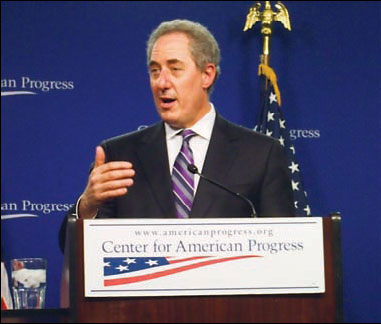US woos TPP public support
|
US Trade Representative Michael Froman speaks about US trade policy at the Center for American Progress in Washington on Tuesday. Chen Weihua / China Daily |
The US government has been struggling to win support among the public and lawmakers for the Trans-Pacific Partnership (TPP), not to mention other free trade agreements.
US Trade Representative Michael Froman on Tuesday touted the benefits the free trade agreements will have on the US economy, exports, jobs and narrowing the inequality gap, all of which have been raised as serious concerns among US voters.
"The question we face is not whether we can roll back the tide of globalization. It is whether we are going to shape it or be shaped by it," Froman said during a speech at the Center for American Progress in Washington.
The Obama administration has been facing mounting pressure lately, including from his own Democratic Party, over its efforts to pursue a "Fast Track" bill that would give the White House sweeping powers to sign free trade agreements such as the TPP. Many lawmakers worry that it would take away their oversight role and keep them in the dark.
Already, Senate Majority leader Harry Reid and House Minority leader Nancy Pelosi, both Democrats, have announced their opposition of the "Fast Track" bill.
Workers unions are worried that free trade agreements such as the TPP will result in job losses to countries such as Vietnam, if the treaty does not include strict rules on labor rights and environmental protection.
A Gallup poll last week showed that jobs and unemployment have been the top concerns for American public.
But Froman on Tuesday stressed that standing for American workers and protecting the environment are among the core values of US trade policies, citing a rosy prospect that the middle class in Asia will expand from the current 525 million to 2.7 billion by 2030, six times the US market.
Froman announced new steps to be taken by the Obama administration to help improve public understanding of trade negotiations, including inviting various representatives into advisory committees and provide more information to the public on the progress of the negotiations.
The TPP involves the US and 11 other nations, which have a total of 800 million people and account for about 40 percent of the global economy. The other nations are Canada, Japan, Australia, New Zealand, Singapore, Malaysia, Brunei, Vietnam, Chile, Mexico and Peru.
Obama had ordered US negotiators to conclude the deal by the end of 2013, but wide differences among members prolonged talks. The next TPP meeting will begin on Feb 22 in Singapore.
It is expected that Obama will also focus on the TPP as a key agenda item during his trip to Asia in April, as many TPP members are looking with increasing suspicion over the prospects of the TPP ever getting endorsed by the US Congress.
China has adopted a more flexible policy towards the TPP, following its initial suspicion of it as an attempt by the US to contain China. China and India, the two most populous Asian nations, are now excluded from TPP negotiations.
In laying out China's foreign policy priorities for 2014, Foreign Minister Wang Yi said China will face member states of the TPP talks and other FTA initiatives with an open attitude.
But Froman said last month in the World Economic Forum in Davos, Switzerland, said the US first wanted to see whether China and the US could make progress on a bilateral investment treaty that the two countries agreed on last July to start formal negotiation.
On Tuesday, Froman vowed to push back on China's unfair indigenous innovation policies and he also quoted Obama's words from the State of the Union address last month that "for the first time in over a decade, business leaders around the world are declaring that China is no longer the world's number one place to invest, America is".
But Ryan Rutkowski, a researcher at the Peterson Institute for International Economics, argued that China has maintained its allure for foreign firms.
"China remains one of the most attractive for foreign direct investment in the world. China's share of global FDI stock has doubled in the last five years alone," he wrote on Peterson's website.
Rutkowski argued that foreign firms remain attracted to China because it still has superior returns. "The income generated by foreign enterprises in China is among the highest in the world," he said, adding that the return generated by FDI stock in China averaged 9.4 percent between 2002 and 2012, compared with the 5.8 percent for investment in the US.
With a foreign trade over $4 trillion in 2013, China has for the first time surpassed the US as the world's largest trading nation. China is also the largest trading partner for many of the TPP members.

























